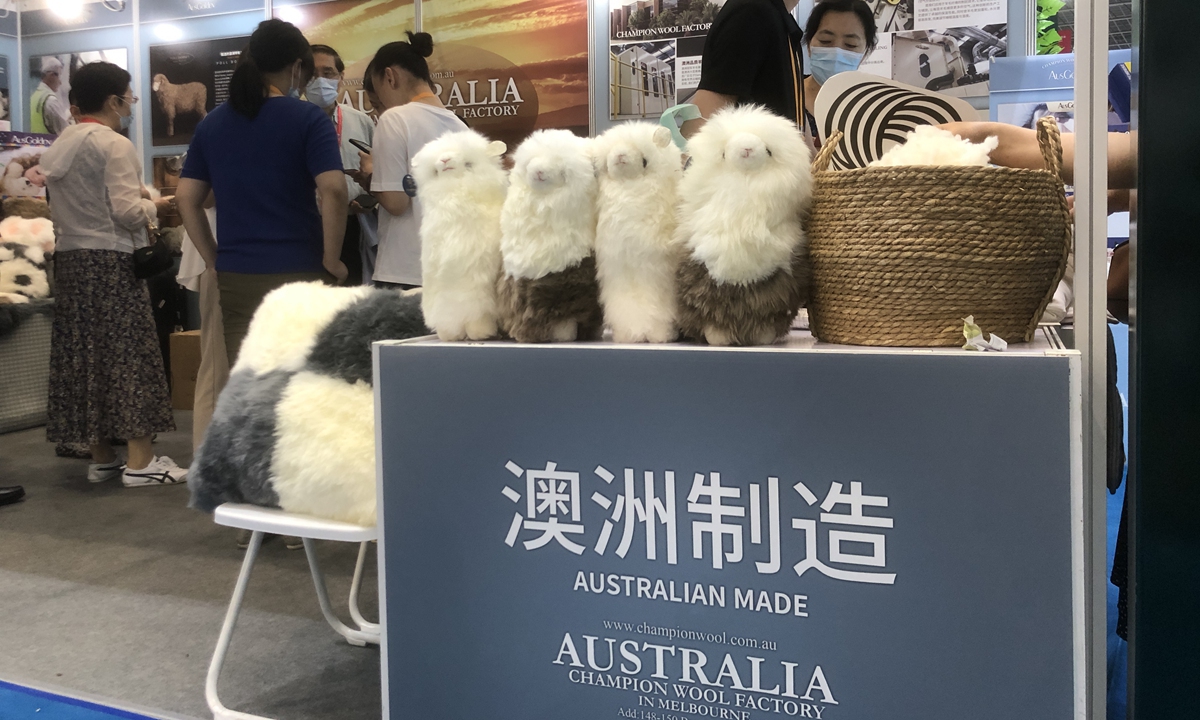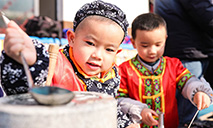Australian firms strive to return to China, but their politicians still pose hurdle

Australian firm Champion Wool Factory presents its wool products during the China International Consumer Products Expo in Haikou, capital of South China's Hainan Province on May 8, 2021. (Photo: Zhang Hongpei/GT)
China has raised the 2022 import quota for Australian wool by 5 percent compared with 2021, as part of an existing free trade agreement between the two countries, according to the Chinese Ministry of Commerce (MOFCOM) on Wednesday, underscoring China's commitment to carry out trade agreement despite tenses diplomatic tension.
However, as Canberra continues to adopt a hostile approach toward China, many Australian businesses are facing a tough time in the Chinese market, and some winemakers, coal traders and other industry players that have been hit hard by deteriorating bilateral ties are actively seeking ways to stay in China.
The import quota for Australian wool in 2022 is set to be 40,203 tons, a 5-percent increase compared with 38,288 tons in 2021, the MOFCOM stated on its website on Wednesday.
The increase is conducted under a bilateral free-trade agreement signed in 2015, in which China grants duty-free treatment to Australian wool up to the quota level, which increases by 5 percent every year until 2024.
Industry insiders said that the move serves as a reminder of the bigger bilateral trade potential, although this has been seriously disrupted by the Australian government's provocative approach.
"This action shows that China has always acted in accordance with market conditions. In addition, it also shows that the demand in the Chinese market is always there," Chen Hong, a professor and director of the Australian Studies Centre at East China Normal University, told the Global Times on Wednesday.
In an exclusive written interview with the Global Times, Nick Coyle, CEO of the China-Australia Chamber of Commerce (AustCham China), expressed on Wednesday his expectation for more economic and trade ties to be unleashed between the two countries.
The key driver here is complementarities, Coyle said, noting that "Australian consumers continue to buy quality Chinese goods, including vehicles, tech and other high-quality finished goods, while there has been strong investment from China into healthcare-related industries."
Several traders and business representatives in sectors such as wine and coal told the Global Times on Wednesday about their growing efforts to sustain market share in China amid deteriorating relations.
As Australian business owners are groping for ways to restore their business interests in China, varied measures have been adopted, including using third countries and regions, or seeking cooperation with Chinese partners.
The Australian wine business in China has come across what could be the biggest hurdle in decades with anti-dumping tariffs of up to 218.4 percent.
A wine trader surnamed Lin based in South China's Guangzhou said that to avoid tariffs, some Australian wine brands are investing heavily in vineyards in the US and South Africa, but many of these products are ultimately going to China.
There have also been cases of Australian wine merchants trying to gain share in the Chinese market in cooperation with Chinese wineries, the insider said.
Traders dealing with Australian coal, another major export-reliant good, are also seeking business opportunities in China where the sector's trade has come down to a "puny level" after domestic buyers diversified their sources of supplies from countries such as Russia, Mongolia and the US, to fend off the risks of the soured relations.
A market insider told the Global Times on Wednesday that some Australian coal traders are probing the Chinese market via third countries or re-export trade.
"There were cases of traders attempting to enter the Chinese market by forging certificates of origin," he said.
While China has a high demand for Australian coking coal, an important material for making steel, Australian coal is not irreplaceable. For example, China's coal imports from Russia, Indonesia and the US are increasing, as rising substitutes for Australian coal.
The efforts to enter the Chinese market through third countries showed that Australia is very dependent on the Chinese market, even though the Australian side keeps claiming that it was looking for new markets, Chen said.
"It is impossible to replace China's large economy for Australian exporters," he said.
China has been Australia's biggest trading partner in almost all kinds of major goods ranging from agricultural products like wool to raw materials such as iron ore, but the Australian government's hostility toward China has caused unprecedented challenges for its companies.
In order to keep up with the Chinese market, AustCham China has undertaken a number of initiatives, including direct meetings with senior officials in Canberra as well as a series of flash surveys to understand challenges and opportunities in the market.
"We have been urging policymakers to emphasize the complementarities of our two economies, and our members are overwhelmingly positive with regard to the opportunities," Coyle said.
Coyle hopes that, with increasing global mobility as the world emerges from COVID-19, both China and Australia will see a two-way return for students and tourism as well as Australia's traditionally strong performers in mining, energy and agricultural trade with China.
However, that would depend on whether the Australian government can change its hostile approach toward China.
"Australian politicians should respond to the calls of their own companies, and strive to restore trade between the two countries to normal levels as soon as possible," Chen said.
Photos
Related Stories
- No Australian officials invited to Beijing Winter Olympics: spokesperson
- Opportunities in China haven't disappeared for Australian businesses, says report
- Western allies gain from Australia's trade tensions with China, shows report
- Octopus intelligence put to test in new Australian research
- BBIBP-CorV developed by China's Sinopharm among COVID-19 vaccines recognized by Australia
Copyright © 2021 People's Daily Online. All Rights Reserved.










